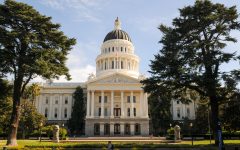
State Capitol. (Photo: Kevin Sanders for California Globe)
Frequently Asked Questions about Bagley-Keene Open Meetings Law
How expansive is the definition of a ‘state body?’
By Chris Micheli, January 28, 2024 2:45 am
What are the three main open meetings laws in California? These open meeting acts are generally referred to as “Bagley-Keene” (applying to state entities), “LOMA” (applying to the Legislature), and the “Brown Act” (applying to local entities).
When was the state entities law adopted? “Bagley-Keene,” as it is known in the Capitol community, was adopted in 1967.
What does the California’s Constitution say? The California Constitution declares that “the meetings of public bodies and the writings of public officials and agencies shall be open to public scrutiny”. As a result, the state constitution mandates open meetings for state agencies, boards, and commissions.
What is the intent of the Bagley-Keene Act? It provides that “The people of this state do not yield their sovereignty to the agencies which serve them. The people, in delegating authority, do not give their public servants the right to decide what is good for the people to know and what is not good for them to know. The people insist on remaining informed so that they may retain control over the instruments they have created.”
What is the policy behind the Bagley-Keene Act? Government Code Section 11120 provides the following:
“It is the public policy of this state that public agencies exist to aid in the conduct of the people’s business and the proceedings of public agencies be conducted openly so that the public may remain informed. In enacting this article the Legislature finds and declares that it is the intent of the law that actions of state agencies be taken openly and that their deliberation be conducted openly.
“The people of this state do not yield their sovereignty to the agencies which serve them. The people, in delegating authority, do not give their public servants the right to decide what is good for the people to know and what is not good for them to know. The people insist on remaining informed so that they may retain control over the instruments they have created. This article shall be known and may be cited as the Bagley-Keene Open Meeting Act.”
What is the notice requirement of the Bagley-Keene Act? Notice of state agency or department meetings must be provided to any person who makes a request in writing at least 10 days in advance of the meeting.
What is required in the notice? Notices must include a specific agenda for meetings, including the items of business to be transacted or discussed, and no item may be added to the agenda subsequent to the notice.
Can action be taken on items not on the agenda? Yes, state entities may take action on items of business not on the agenda under certain limited circumstances, most notably upon a determination by a majority vote of the State entity that an emergency situation exists.
Where must the agency conduct its meeting? The Act prohibits a State agency from conducting any meeting or function in any facility which prohibits admittance to any person on the basis of race, religious creed, color, national origin, ancestry, or sex.
What is a “meeting”? Government Code Section 11122.5(a) defines a “meeting” to include any congregation of a majority of the members of a state body at the same time and place to hear, discuss, or deliberate upon any item that is within the subject matter jurisdiction of the state body to which it pertains.
What is a “state body”? Government Code Section 11121 provides that every state board, or commission, or similar multimember body of the state that is created by statute or required by law to conduct official meetings is a state body.
How expansive is the definition of a “state body”? This definition applies to advisory committees and other informal bodies that advise state entities. As a result, even a 3-person advisory committee to a state department must follow the open meeting laws.
What is an “action taken”? Under Government Code Section 11122, action taken means a collective decision made by the members of a state body, a collective commitment or promise by the members of the state body to make a positive or negative decision, or an actual vote by the members of a state body when sitting as a body or entity upon a motion, proposal, resolution, order or similar action.
What has the Attorney General said about “collective commitment”? According to the Attorney General, “Conversations that advance or clarify a member’s understanding of an issue, or facilitate an agreement or compromise among members, or advance the ultimate resolution of an issue, are all examples of communications that contribute to the development of a concurrence as to action to be taken by the body.”
Are closed sessions allowed? Under Government Code Section 11126, closed sessions can only be held under very limited conditions:
- Appointment, employment, evaluation, or discipline (including dismissal) of a public employee;
- Licensing, honorary degrees, real property negotiations, investments;
- To confer with or receive advice from legal counsel re pending litigation
What are remedies for violation of the Act? If the Bagley-Keene Act is violated, the decision of the body may be overturned if challenged within 90 days under Gov. Code Section 11130.3. Violations may be stopped or prevented pursuant to Gov. Code Section 11130. Costs and fees may be awarded, and criminal misdemeanor penalties may be imposed.
- Frequently Asked Question about What Is Subject to Referendum - April 30, 2024
- Frequently Asked Questions about Voting on a Recall Petition - April 29, 2024
- Should Interpretive Guidance Be Included in California Legislation? - April 28, 2024





One thought on “Frequently Asked Questions about Bagley-Keene Open Meetings Law”